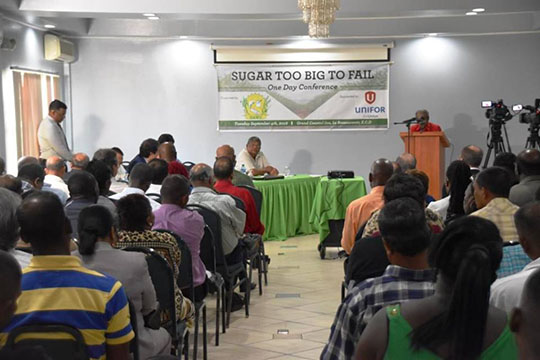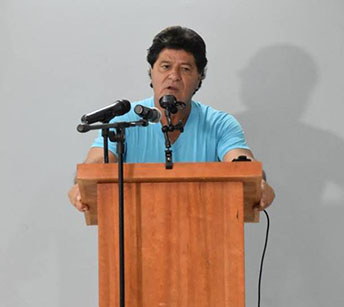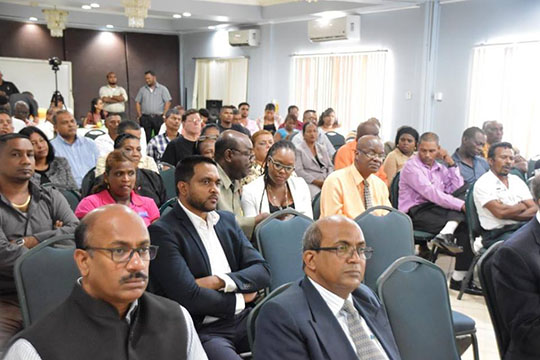Even as it pledged financial and technical support to the Guyana Agricultural and General Workers Union (GAWU), Canada’s largest private sector union, Unifor yesterday criticised the Guyana Government for not meeting its obligations to sugar workers.
“Those who take you down this road must be accountable–accountable for the business decisions that will redistribute the revenues from public assets to private interests,” Unifor’s National President Jerry Dias yesterday told a one-day GAWU conference his organisation sponsored.
“From our experience, what is truly important is that workers’ rights are protected and that the consequences of restructuring are negotiated with your union,” Dias, whose parents are Guyanese, added.
Dias said the situations with workers in Guyana are not too different from those faced by Canadians. “We have felt the pain of entire communities being wiped out. When we start talking about restructuring, restructuring never works out well for the workers because the basic premise is one of capital, is one of profitability,” he explained.
The conference, titled ‘Sugar – Too big to fail,’ was held yesterday at the Grand Coastal Conference Centre at Le Ressouvenir, East Coast Demerara and it saw the participation of the Minister of State Joseph Harmon, Leader of the Opposition Bharrat Jagdeo, Head of the Special Purpose Unit (SPU) Colvin Heath-London, Unifor executives and representatives of regional trade unions and laid off sugar workers, and the United States Embassy, among others. It was intended to explore the ramifications of the recent decisions made to restructure the industry.
Notably absent was representation from the Ministry of Agriculture, which was not invited to the forum as GAWU President Komal Chand noted that the Minister of Agriculture, Noel Holder, informed him that he was not the responsible minister.
Survival and viability
Harmon spoke for government and he maintained that the government’s decision to restructure the industry was not rash, while reminding that it followed a Commission of Inquiry that holistically investigated the industry and found it to be “operationally inefficient.” He said there were also consultations with sugar workers and the union before the decision was made.
Harmon added that while the opposition People’s Progressive Party/Civic objected to the decisions government has made, it never took part in the consultations on the way forward or gave any formal recommendations.
He quoted extensively from President David Granger’s response to the press last Friday as it related to the government’s position on sugar.
Granger said his government will do everything possible to ensure the survival of the industry. Harmon told the conference that when his government took office in 2015, it found GuySuCo with an $82 billion debt and bad investment decisions, such as the US$110 million pumped into the Skeldon estate, which never realised its objectives. “We made a decision… to ensure its survival and return to viability,” Harmon said.
According to Harmon, government does not only see the sector’s reformation from a financial perspective as it is aware of the social implications and is seeking to plan accordingly.
Harmon left the forum shortly after and there was no one from government to answer policy questions from the gathering.
Heath-London, the Head of SPU which is spearheading the divestment of GuySuCo’s assets, made a presentation on most of what NICIL has already made public and said that he could not answer policy questions as that was “higher than my pay grade.”
But Opposition Leader Bharrat Jagdeo took Harmon and government to task for the decisions made, saying that while his party does not object to change, it has to be “grounded on study and realistic work.”
According to Jagdeo, the debt figure cited by Harmon was not correct as by his calculations, “a significant part” of the money was for long term debt, personal liability and to the Guyana Revenue Authority.
As a result, he said the only real short term debt would have been around $10 billion.
He added that much more was lost by the Guyana Gold Board to a company, which he did not name, that received a $47 billion payment that could have been used to help resuscitate the industry. He strongly believes that government can find the money to invest in the sector if it wants to. “We can find the money now to afford it,” Jagdeo stressed.
Defending the decision to invest in the Skeldon Sugar Modernisation Project, Jagdeo blamed the British manager of the company at the time, Booker Tate for the failures, saying that the company failed government by not giving enough value for the consultancy services it paid for.
He used the forum to call on government to be transparent in all decisions about the sector going forward because he believes that secrecy does not bode well for governance or the people of Guyana.
Jagdeo also said that there needs to be meaningful consultations with the workers and their unions and called on government to also honour their obligations to pay workers all of their severance.
Comply
Meanwhile, Unifor’s International Director Mohamad Alsadi acknowledged the two different point of views put forward by the government and the opposition, but drew attention to the way sugar workers here were treated as it pertained to collecting their severance, calling it disturbing.
“We are hoping that the government understands that they need to comply,” he said, while adding that he has never seen a case where a government withholds severance from workers after taking their jobs. “…So, to us this is a big issue and if this was in Canada, I can assure you that their lawyers would probably go to jail,” he added.
To assist laid off sugar workers, Unifor has pledged Canadian $44,000 to GAWU for the implementation of a programme that will see 120 community coordinators from six sugar estates trained to further the discussion on the future of the country’s sugar sector.
The coordinators will also work to increase community involvement and workers’ participation in the restructuring process and to improve conditions for agriculture workers.
“We have worked closely with the Guyana unions and do all we can to help. We have a project that provides training. We will work with them in solidarity and hopefully sort out some of the outstanding issues for the sugar workers because people have families, communities are devastated and that needs to be fixed.
“Hundreds of workers are yet to receive their severance. I am here to work with (GAWU President) Komal (Chand) and GAWU as we move forward with the next project, which would be training 120 community workers in the six areas we would like to work with you… This is our act of solidarity to work with you to train for collective bargaining. The only way we are going to find solutions is if we are in a room together… I know there are discussions about selling the estates but the real issue is how do we reopen the estates and how do we make sure that the workers have a future for the short and more important long-term,” he added.
GAWU’s Chand welcomed the assistance while calling the decision by government to close four of seven sugar estates callous. He said he believed that it was made from a financial perspective without consideration for the social implications and the thousands of vulnerable working class.
“As we take stock of those factors, the sending home of some 7,000 workers over the last two years without any plan to address their welfare and loss of their livelihood, clearly has to be among the most callous of decisions ever made by any government in our country in our over half a century of independence,” he charged.
“The government, by its very actions, has seriously affected communities, has shattered the hopes of the youth, and has pushed thousands of Guyanese into misery-filled lives… Today, the hopes nurtured from such talk as “sugar will never die” or “we will fix sugar” heard boisterously during the 2015 elections campaign, have been dashed. It is most upsetting that this approach had been taken, especially recognising that it was not necessary in the first place and that there were very good and real possibilities to overcome the difficulties in the sugar industry,” he added.
Chand said that the fact that government is now boasting that the industry can be resuscitated to investors means it could have itself invested in its people and reaped the long-term rewards.
“Investors are being told that the estates have the possibilities [for] co-generation, alcohol, ethanol, packaged sugar, and refined sugar, among other things…It was also touted that the estate will offer 85% mechanization from mechanical tillage/planting to harvesting and excellent drainage and irrigation systems with new pumps,” he noted.
“It is incomprehensible to the rational thinker that an enterprise with such obvious advantages was even identified for closure in the first place. The GAWU cannot help but wonder whether these clearly seen features did not leap out at our decision-makers and cause them to second-guess whether they were being properly advised or being led astray?” he added.
‘Promises, promises’
Employees were also brought from some of the shuttered estates to tell first-hand how they are coping. Makeisha Bess, of Skeldon, said that she is now forced to do laundry services where she hand washes four tubs of clothes for $1,000.
Pensioner Lall (only name) of the LBI Estate bemoaned the numerous bills he receives and was hopeless when he considered how he would pay them.
The same was the case for Sohan Rabindranath, of Rose Hall Estate, who received $372,000 in severance for his over two decades of service and he is left to wonder how he will take care of his wife and three children.
Mr. Bacchus, of Wales, bemoaned the wait for his severance even as he related that the former workers from that estate feel like they have forgotten. “Everybody except Wales’s people are receiving and we are still to get a dollar,” he said. “Before this I was strong but [from] the stress from it I get high pressure, low pressure, wind pains… and all kind a things. It is just promises, promises we getting. Two years now since we close and still promises,” he added.













